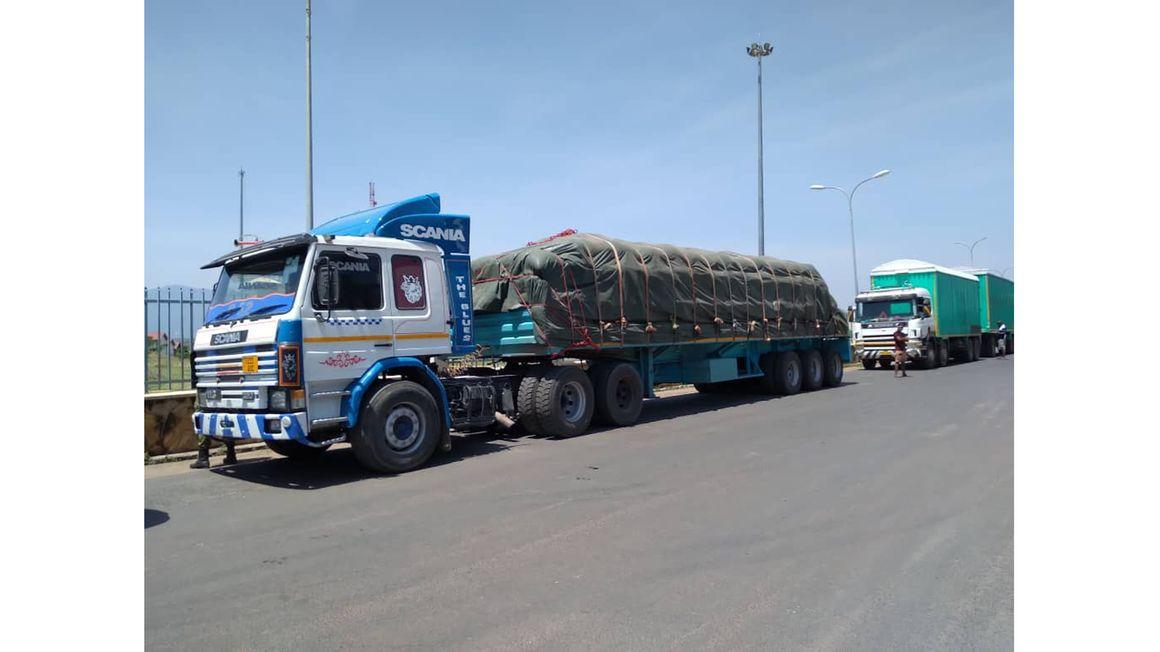Africa-Press – Kenya. Uganda was the only country in the region to record a trade increase of 4.6 percent in 2020, a year when the average economic growth for the entire East African region declined to as low as 2.3 percent from 5.4 percent in 2019.
In general, EAC member states lost $3.36 billion worth of trade in the year when the Covid-19 pandemic spread like bushfire, cutting global trade links and pushing regional and global economies into total lockdowns, according to the latest draft report on EAC Trade and Investment for 2020.
The report shows that the total investment in the region declined by almost 46.29 percent in 2020.
Overall trade for the six member states — Rwanda, Uganda, Tanzania, Burundi, Kenya and South Sudan — dropped by 6.08 percent to $51.91 billion in the period, from $55.27 billion in 2019.
In the six years between 2015 and 2020, the region lost about $1.54 billion (three percent) of its trade to $51.91 billion from $53.45 billion in 2015, the report says.
“Unfortunately, the pandemic containment measures imposed by regional governments negatively impacted free movement of goods and persons. Unprecedented long queues of trucks were witnessed in borders due to long periods of waiting for Covid-19 test results by truck drivers. Those who tested positive to Covid-19 were denied entry into neighbouring partner states,” said Peter Mathuki, EAC Secretary General.
The report shows that EAC’s intra-regional exports declined by 7.37 percent in 2020 as the pandemic reduced manufacturing output and slowed down economic activities.
Intra-EAC imports declined by 3.71 percent in the same period.
Total EAC imports fell by 9.77 percent to $35.65 billion from $39.51 billion, a result of the containment measures adopted by governments, which cut trade with import partners such as China, India and the EU.
On the bright side, total exports from the region increased by 3.15 percent to $16.25 billion from $15.76 billion in 2019 due to increase in the value of EAC exports to the United Arabs Emirates and the UK.
Burundi’s total trade fell by 7.9 percent to $840.1 million in 2020 from $913.2 million in 2019, while exports to its EAC peers declined by 16.4 percent to $12.2 million from $14.6 million.
Its overall domestic export earnings declined by 24.57 percent to $153.42 million from $203.4 million, while domestic imports decreased by 2.59 percent, to $909.81 million from $934 million in the same period.
Kenya’s total trade in goods dropped by 8.76 percent to $21.42 billion in 2020 from $23.48 billion in 2019, with the country’s imports declining by 12.7 percent to $15.4 billion from $17.64 billion. Its export business increased by 3.14 percent, with total exports to the rest of the world rising to $6.02 billion from $5.83 billion in the same period.
According to the report, Kenya remained the trade leader in services in the EAC and even at the peak of the pandemic in 2020, the services sector strongly supported the country’s economy.
In Rwanda, total trade in goods increased by 13.17 percent to $3.59 billion in 2020.
However, while Rwanda’s imports rose by 2.28 percent to $2.63 billion from $2.57 billion its exports to the rest of the world fell by 17.85 percent, to $958.4 million from $1.16 billion in 2019.
“Notwithstanding, trade in services plays an important role in the economy of Rwanda,” the report notes.
In 2020, services on intellectual property in Rwanda grew by 100 percent, and, due to increased demand for ICT, telecommunication, computer and information services, the sub-sector grew by 5.4 percent, recording $20.9 million in revenue.
In South Sudan total trade to the world declined by 93.54 percent to $36.85 million from $553.22 million in 2019 while total intra-EAC trade with South Sudan dropped to $11.2 million from $232.7 million in the same period.
Minerals accounted for the biggest proportion of Tanzania’s exports in 2020, with gold being the highest export worth $2.95 billion, comprising more than 50 percent of the country’s total exports.
Tanzania’s total trade increased marginally by 3.7 percent to $14.58 billion in the period from $ 14.05 billion in 2019.
Tanzania’s main export destinations in the EAC during the year included Kenya ($230.2 million), Rwanda ($208 million), Uganda ($191.3 million) and Burundi ($179 million).
However, Uganda’s total trade increased by 4.6 percent to $12.39 billion in 2020 from $12.84 billion in 2019. Its imports rose by 6.41 percent to $8.25 billion from $7.75 billion while total exports increased by 1.13 percent to $4.14 billion from $4.09 billion.
The report notes that despite the pandemic there is great potential for growth in trade and investment in EAC and recommends that partner states review and harmonise Covid-19 testing charges, validity and implement mutual recognition of Covid-19 certificates to ensure safe and smooth movement of goods, people and services in the region.
It also recommends that EAC member countries implement the harmonised EAC Administrative Guidelines on Covid-19 and adopt the EAC Covid-19 Economic Recovery Plan.
Furthermore, partner states should provide an open, transparent and predictable regime for investment and improve the ease of doing business.
They should embrace industrialisation and value addition to promote exports, job creation and intra-EAC trade and reduce trade imbalance.
The report reveals that the pandemic wiped out EA’s more than $5 billion investments and 153,000 jobs in a year.
The total investment into the East African region declined by almost 46.29 percent in 2020 to $6.25 billion from $11.64 billion in 2019.
Foreign Direct Investments (FDI) into the region declined by 43.39 percent $4.91 billion in 2020 from $8.67 billion in 2019, with only Burundi recording the highest percentage growth of 173 percent to $348.1 million from $127.2 million.
FDI inflows to Kenya declined by 24.63 percent to $917.93 million while inflows to Rwanda fell by 47.93 percent to a low record of $1.28 billion.
Notably, the FDI inflows to South Sudan showed a decrease of 67.75 percent to $1.25 billion from $3.87 billion in 2019, while that of Tanzania declined by 71.25 percent to $754.59 million during the period under review. FDI inflows into Uganda increased by 16.57 percent to $1.44 billion in 2020.
It was noted that attracting the highest FDI did not translate to more jobs as the number of jobs created as a result of FDI inflows to the EAC fell by 72.5 percent to 58,017 jobs in 2020 from 211,084 in 2019. Although Uganda attracted less FDI inflows compared to South Sudan (highest), and Rwanda (second-highest), the country created the most jobs at 21,818 and representing 37 percent of total jobs.
Rwanda created 19,218 (32.5 percent), while South Sudan created 3,948 jobs (6.6 percent), Kenya (4,738) and Burundi 6,135 jobs. The FDI into Tanzania created the least number of jobs at 2,160.
According to the report total Intra-EAC investments plummeted by 80.27 percent to $142.95 million from $724.60 million as the number of projects fell to 61 from 74 in 2019.
The manufacturing sector attracted the greatest amount of FDI in 2020 at $1.44 billion, which created 8,749 jobs. It was followed by finance, insurance, real estate and business services.
The report notes that domestic investments have become the key development strategy for the EAC.
In 2020, Uganda marked a large increase in domestic investment value by 19.72 percent to $518.38 million, followed by Rwanda whose domestic investment stood at $331.39 million.
However, Burundi experienced the highest percentage increase as it more than doubled its domestic investments to $251.57 million in 2020 from $87.2 million in 2019.
Globally, FDI flow fell by 37 percent to below $1 trillion for the first time since 2005, with the number of FDI projects also declining by a third from 2019 levels.
For More News And Analysis About Kenya Follow Africa-Press






